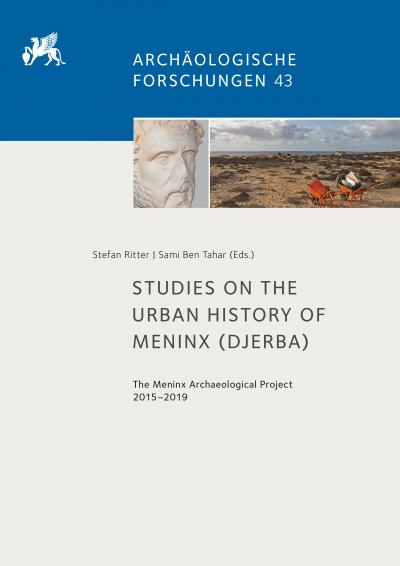Studies on the Urban History of Meninx (Djerba): The Meninx Archaeological Project 2015–2019
https://doi.org/10.34780/76fu-8peb
Über dieses Buch
Meninx war in der Antike der namengebende Hauptort der Insel Djerba. Die weitläufige, an einem geschützten Golf gelegene Hafenstadt war eines der bedeutendsten Produktionszentren von Purpur im Mittelmeerraum und entwickelte sich zu einer der größten Metropolen im römischen Nordafrika. 2015 wurde in Kooperation zwischen dem Institut für Klassische Archäologie der Universität München und dem Institut National du Patrimoine, Tunisie ein archäologisches Forschungsprojekt initiiert, um die urbane Entwicklung der bislang kaum bekannten Antikenstätte zu erkunden. Zunächst wurde mittels großflächiger geophysikalischer Prospektion die Struktur der Stadtanlage geklärt. Bei zwei Feldforschungskampagnen 2017 und 2018 wurden dann gezielt Grabungen durchgeführt, die mit ihrem reichen Fundmaterial exemplarische Einblicke in verschiedene Bereiche des städtischen Lebens in allen Perioden der Siedlungsgeschichte erbrachten, von punischer Zeit bis in die Spätantike (4. Jh. v. Chr. bis 7. Jh. n. Chr.). Zudem gelang es mittels unterwasserarchäologischer Untersuchungen, erstmals Aufschluss über die Hafenanlagen von Meninx zu gewinnen.
Der vorliegende Band bietet eine Synthese der vielfältigen Ergebnisse dieser Untersuchungen. Hierbei wird deutlich, dass Meninx mit seinen regionalen und überregionalen Wirtschaftskontakten eine zentrale Rolle für die Insel spielte, die als Knotenpunkt zwischen den mediterranen Seehandelsnetzen und dem nahen Festland mit seinen in die Sahara führenden Handelsrouten fungierte. In seiner Rolle als Produktions- und Handelszentrum unterschied sich Meninx von den anderen tripolitanischen Küstenmetropolen, Sabratha und Lepcis Magna, markant dadurch, dass das städtische Leben völlig auf das Meer und seine Ressourcen fokussiert war.
Schlagworte:
Djerba, Nordafrika, Urbanistik, punisch, römischKapitel
-
Preface: The Meninx Archaeological Project
-
I. Introduction: The History of Research on Meninx and our Objectives
-
II. Methodology1. Engineering Geodesy in Meninx – 2. Archaeological Geophysics – 3. The Database Management
-
III. The Urban Layout: Results of the Magnetometer Survey
-
IV. The Urban History of Meninx: A Synthesis of our Results1. The Punic and Late Punic Periods – 2. The Early, Middle and Late Roman Periods – 3. The Late Antique Periods
-
V. The Excavations1. Introduction – 2. Trench 1 – A Main Road through Meninx in the Area of the Macellum – 3. Secteur 2 – Une maison punique et son occupation jusqu’à la fin de l’Antiquité – 4. Schnitt 3 – Ein Thermengebäude am Forum – 5. Trench 4 – Early Punic ...
-
VI. The Underwater Archaeological Investigations (with Trenches 10–12)
-
VII. Other Field Studies1. Architekturhistorische Untersuchungen in Meninx – Die Bauteile im Pavillon – 2. Der Nördliche Zisternenkomplex – Bauforscherische Untersuchung der freiliegenden Strukturen – 3. The Quarries
-
VIII. The Finds1. Die Funde: Einführung – 2. La céramique – 3. Liste des datations des unités stratigraphiques (SE) de Meninx 2017–2018 – 4. The Coin Finds – 5. Römische Statuetten aus den Thermen (Schnitt 3) – 6. Ein Marmorkopf des Antoninus Pius aus Meninx ...
-
IX. Natural-sciences Research1. Archaezoology in Meninx: Palaeoeconomy between Local Economic Structure and Supra-regional Network – 2. Fish Exploitation at Meninx – 3. Crop Cultivation and Land-use on Djerba from Phoenician Times to Late Antiquity (4th cent. B.C.–6th cent. A.D.) ...
-
ملخص
-
Bibliography
-
List of Figures
-
Illustration Credits




